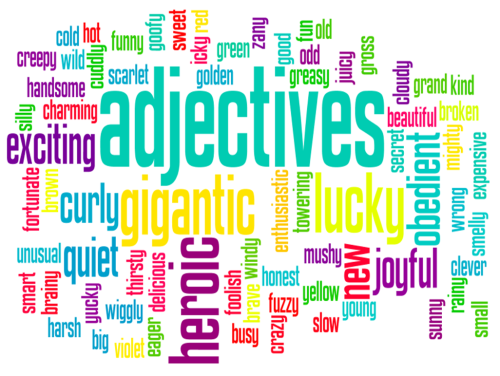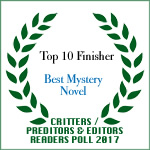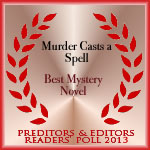Few rules in creative writing are inviolate. This is true of the much-touted view that all adjectives should be eliminated from writing pieces. I maintain adjectives have an essential role to play in modern fiction. However, I do agree with Mark Twain’s words about the use of adjectives:
When you catch an adjective, kill it. No, I don’t mean utterly, but kill most of them – then the rest will be valuable.
The operative word is “most.” Of course we need to be selective and employ moderation in using adjectives.
Adjectives are words that modify nouns. Simple examples are small, purple, bald and foolish.These kinds of words are necessary in prose to help provide descriptions for the reader. In short, adjectives give us more information about people, places and things that enable us to understand and form a clearer picture of them. A well-placed and specific adjective can strengthen or clarify an image.
The key is, adjectives should be used only when they highlight something the noun can’t highlight. For example don’t use the adjective “high” to describe a skyscraper. The noun, skyscraper, already conveys the idea of height. On the other hand, a moonlit meadow is a good use of the adjective, “moonlit.” It lets the reader know it’s a clear evening in the meadow.
In narratives, it’s important to use strong adjectives rather than broad, meaningless adjectives such as beautiful, pretty, horrible, pleasant, wonderful. However, broad adjectives do work well in dialogue. “‘I had a wonderful time this evening,” Mary said.” This contributes something important to the story.
Specific adjectives eliminate vagueness when used to describe places, people or things. Use them, but choose strong descriptors that create a vivid image for the reader.
Adjectives have their place in modern fiction. Just remember to choose them carefully and use them sparingly.
Too Much Description, Too Much Explaining
4 Do’s and Don’ts of ”Show, Don’t Tell.”












Hi Nancy, great advice. Also adverb overuse really stands out. “You go back and sit in your room for an hour, young lady,” my mom said angrily. Here, the word choice in the quotations already conveys “angrily.” These days, you most likely don’t even need the attribution (“my mom said”) at all. If you feel you must use an adverb, chances are you haven’t worked hard enough on selecting the right verb. Try writing it four or five different ways choosing different adjectives or adverbs. Read them all through with some context. That is, include up to a few sentences before and a few sentences after. Among your attempts should be the bare bones way (no adjectives or adverbs). If they all seem like a tossup, use the minimum words, i.e. stripped of adjectives and adverbs. Seems like a lot of work to you? Well, yes. That’s what good writers do, a lot of work. It underlines how important losing unnecessary adverbs and adjectives is as a writer’s objective. Yet, there is occasionally a place for either. Striking the right balance may make you famous.
By the way, my suggestions apply to the re-write phase. You should probably keep all the adjectives and adverbs that come to you in the “lousy first draft.” Creation should be totally without your inner editor, Use all the words that come easily to you during the white hot flow of creating your story.
LikeLike
By: richwriting on June 8, 2015
at 8:45 am
Great comment. Good analysis of the use of adverbs—when and when not to use. I agree, on draft one, just write. Clean up in rewrites. Thanks for sharing your wisdom.
LikeLike
By: nancycurteman on June 8, 2015
at 4:15 pm
I love adverbs as a reader; consequently, I will not refrain from writing them shamelessly and massively.
LikeLike
By: schillingklaus on April 4, 2016
at 11:04 pm
There is a place for adverbs in writing. If they enhance your writing, use them.
LikeLike
By: nancycurteman on April 5, 2016
at 2:55 pm